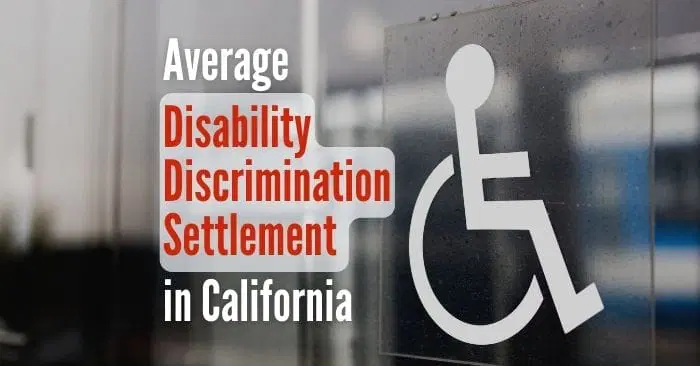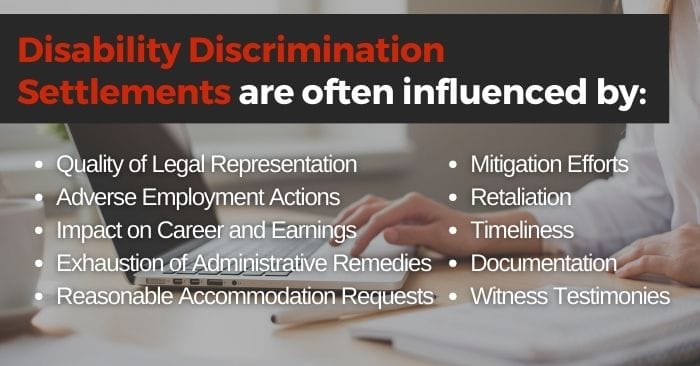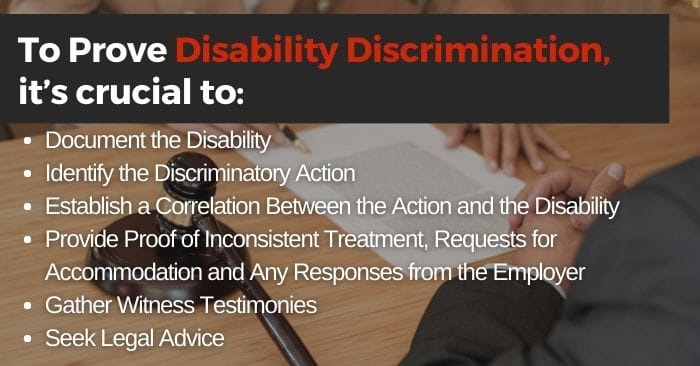
Average Disability Discrimination Settlement Amount in California
Legally reviewed by: Jessica Anvar Stotz, JD, MBA
Short answer: The average disability discrimination settlement in California can range from approximately $25,000 – $500,000.
Settlements in less complex cases often settle for around approximately $100,000 or lower and complex cases can surpass approximately $1,000,000.
Average Disability Discrimination Settlement Amount in California
| Complexity of Case | Average California Disability Discrimination Settlement |
| Minor | Approximately: $25,000 – $100,000 |
| Moderate | Approximately: $100,000 – $500,000 |
| High | Approximately: $500,000 – $1,000,000+ |
Example Disability Discrimination Settlements
- Walmart Settlement: An eight-member jury in Green Bay, Wisconsin returned a verdict of $125,150,000 in favor of the U.S. Equal Employment Opportunity Commission (EEOC) on three claims of disability discrimination against Walmart1. The jury found that Walmart failed to accommodate Marlo Spaeth, a longtime employee with Down syndrome, and then fired her in July 2015 because of her disability1. The EEOC presented evidence that a change Walmart made to Spaeth’s long standing work schedule caused her significant difficulty1.
- PNM Settlement: Public Service Company of New Mexico and PNMR Services Co. agreed to pay $750,000 to settle an employment discrimination lawsuit brought by the U.S. Equal Employment Opportunity Commission (EEOC). The lawsuit charged PNM implemented policies and practices which failed to accommodate qualified employees with disabilities and fired them because of their disabilities or in retaliation for opposing unlawful disability discrimination.
- BaronHR Settlement: The U.S. Equal Employment Opportunity Commission (EEOC) filed a lawsuit in federal court against BaronHR for discriminatory employment practices based on race (Black, Asian, and white), national origin (non-Hispanic), sex (male and female), and disability. The lawsuit alleges that since at least 2015, BaronHR has failed to recruit and refer Black, Asian, and white, non-Hispanic workers for low-skill positions and has denied male and female workers certain placement opportunities based on sex. The lawsuit further alleges that BaronHR screened out individuals with disabilities and perceived disabilities by only hiring and referring supposedly physically fit candidates with no history of injury.
Factors That Influence Disability Discrimination Settlement Amounts
Below are some factors that specifically apply to employees filing a lawsuit related to disability discrimination:
Legal Representation
Having competent legal representation is crucial. The choice of attorney, their experience in employment discrimination cases, and their ability to build a strong case can significantly impact the lawsuit’s outcome.
Timeliness
Filing a lawsuit within the prescribed time limits is essential. In California, for example, there are specific deadlines for filing employment discrimination claims, and failing to meet them can affect the case.
Exhaustion of Administrative Remedies
In many cases, employees must first exhaust administrative remedies by filing a complaint with relevant government agencies, such as the Department of Fair Employment and Housing (DFEH) in California, before pursuing a lawsuit. Compliance with these prerequisites is a key factor.
Documentation
Thorough documentation of the discrimination, including records of incidents, correspondence, and medical documentation, can strengthen an employee’s case.
Reasonable Accommodation Requests
If the employee has requested reasonable accommodations for their disability and was denied, the handling of these requests is a critical factor in the lawsuit.
Witness Testimonies
Witnesses who can corroborate the employee’s claims can be influential in the case. Their willingness to testify can impact the strength of the lawsuit.
Adverse Employment Actions
If the employee experienced adverse actions such as demotion, termination, or denial of promotions as a result of discrimination, these actions are central to the lawsuit.
Impact on Career and Earnings
The financial and career impact of the discrimination, including lost wages, benefits, and future earning potential, is a key factor in determining damages.
Mitigation Efforts
Employees are generally expected to make reasonable efforts to mitigate their losses, such as seeking alternative employment. How well these efforts are executed can be considered in the lawsuit.
Retaliation
If the employee faced retaliation for filing a complaint or lawsuit, this is an important factor that may result in additional claims.
*It’s important to note that each disability discrimination case is unique, and these factors interact in complex ways. Settlement amounts are ultimately negotiated by the parties involved, often with the guidance of legal professionals, to address the specific circumstances of the case.

Types of Compensation Available for Victims
Below are some of the types of compensation available for disability discrimination victims:
Economic Damages
Economic damages cover tangible financial losses, including lost wages, benefits, and medical expenses resulting from the discrimination.
Non-Economic Damages
Non-economic damages encompass more intangible losses, such as compensation for emotional distress, pain and suffering, and loss of enjoyment of life.
Punitive Damages
In cases of particularly egregious discrimination, punitive damages may be awarded to punish the responsible party and deter future misconduct.
Attorney’s Fees and Legal Costs
Victims may be entitled to compensation for attorney’s fees and the legal costs incurred while pursuing their discrimination case.

How Do You Prove Disability Discrimination?
Proving disability discrimination in the workplace involves demonstrating that an adverse employment action was taken based on an individual’s disability. Below are a few ways on how you might be able to establish a case for disability discrimination:
Document the Disability
Begin by documenting your disability and any related medical records, diagnoses, or treatment histories. This establishes the existence of a disability.
Discriminatory Action
Identify the specific discriminatory action taken against you, such as termination, demotion, or denial of reasonable accommodations. This is the central issue to address.
Timing and Correlation
Establish a connection between the adverse action and your disability. Timing can be critical; if the adverse action closely follows your disclosure of the disability or a request for accommodation, it can indicate discrimination.
Consistent Treatment
Show that you were treated differently from non-disabled employees in similar situations. Consistency in how the employer treats employees is essential.
Request for Accommodation
If you requested reasonable accommodations, ensure there is documentation of the request and any response from your employer.
Witness Testimonies
Gather witness testimonies from colleagues who can attest to the discriminatory behavior or any comments related to your disability.
Employer’s Response
Document how your employer responded to your complaint or concerns about discrimination. Their actions, or lack thereof, can be telling.
Legal Consultation
Seek legal advice from an experienced employment discrimination attorney who can help you navigate the legal requirements, gather evidence, and build a strong case.
When You DO Have a Claim and When You DO NOT
Indicators of a Potential Disability Discrimination Claim
- Adverse Employment Action: If an employee experiences adverse actions such as termination, demotion, reduced hours, or denial of promotions shortly after disclosing their disability or requesting accommodations, it may indicate potential discrimination.
- Differential Treatment: When an employee observes that they are treated differently from non-disabled colleagues in similar situations, it can be a sign of discrimination. This includes disparities in work assignments, disciplinary actions, or access to benefits.
- Request for Accommodation: If an employee has requested reasonable accommodations due to their disability, and their employer fails to provide or engage in an interactive process to discuss accommodations, it may suggest discrimination.
- Harassment or Hostile Work Environment: Experiencing harassment, derogatory comments, or a hostile work environment based on one’s disability is indicative of discrimination.
- Retaliation: If an employee faces adverse actions for filing a complaint or lawsuit related to disability discrimination, it could be a sign of retaliation, which is often linked to the original discrimination claim.
Indicators of a Lack of a Valid Claim
- Absence of Discrimination: If there is no concrete evidence or specific instances of discriminatory treatment based on disability, the claim may lack validity.
- Non-Disability Related Reason: If an adverse action is clearly linked to non-disability related factors, such as poor performance, misconduct, or organizational restructuring, it may not support a disability discrimination claim.
- Missing Request for Accommodation: If the employee never requested reasonable accommodations or the employer provided and engaged in the interactive process for accommodations, this could weaken a discrimination claim.
- Legitimate Business Reasons: If the employer can demonstrate legitimate, non-discriminatory reasons for their actions, such as documented performance issues or budgetary constraints, it may undermine the validity of a claim.
- Lack of Witnesses or Evidence: Without corroborating witnesses, relevant documents, or a consistent pattern of discriminatory behavior, it can be challenging to establish a valid discrimination claim.
Why Hiring a Lawyer Can Be Crucial in Order to Obtain a Settlement
Hiring a lawyer can be crucial to obtain a settlement in a disability discrimination case due to their expertise in navigating complex legal processes, gathering compelling evidence, and negotiating with employers.
Attorneys can assess the strength of your case, ensuring that all relevant factors are considered, and they understand the intricacies of disability discrimination laws. They can advocate for your rights, engage in settlement discussions on your behalf, and provide the necessary legal support to compel employers to take your claims seriously.
With a lawyer’s guidance, you significantly enhance your chances of securing a fair settlement that compensates you for the harm you’ve suffered due to discrimination.
Get Connected with a Lawyer
Looking to file a disability discrimination claim? Contact LawLinq today to get connected with one of the best disability discrimination lawyers for your case.


